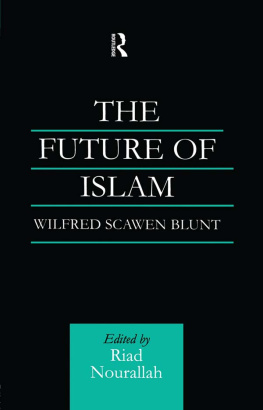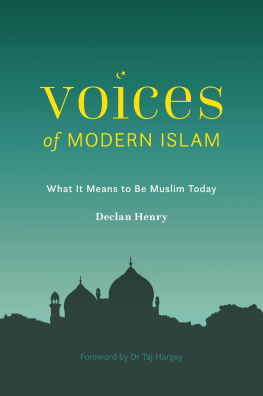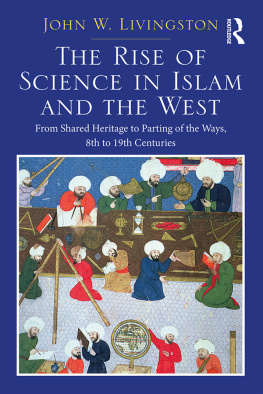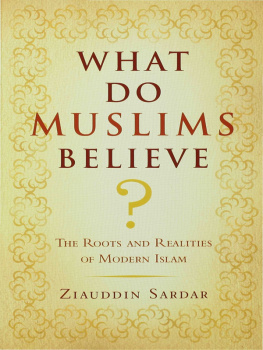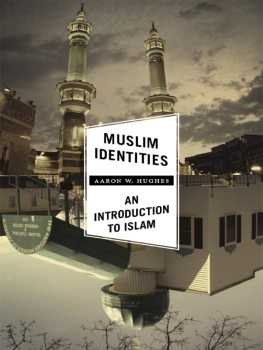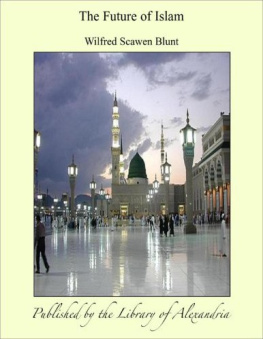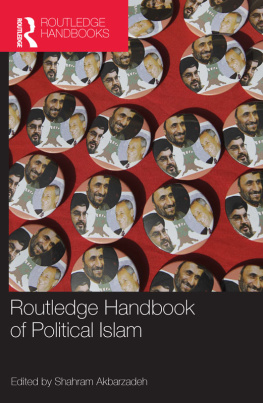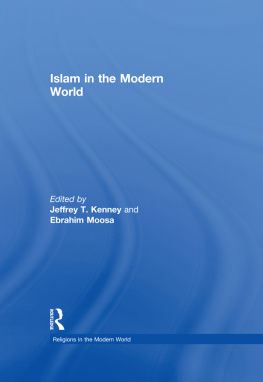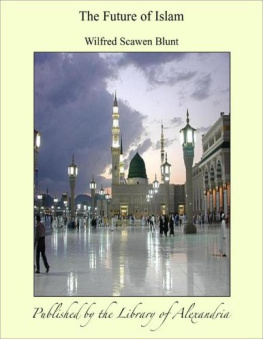THE FUTURE
OF ISLAM
THE FUTURE OF ISLAM
WILFRID SCAWEN BLUNT
Edited by
Riad Nourallah
First Published in 2002
by Routledge
2 Park Square, Milton Park, Abingdon, Oxon, OX14 4RN
Simultaneously published in the USA and Canada
by Routledge
711 Third Avenue, New York, NY 10017
Routledge is an imprint of the Taylor & Francis Group, an informa business
Editorial Matter 2002 Riad Nourallah
Typeset in Hiroshige by LaserScript Ltd, Mitcham, Surrey
All rights reserved. No part of this book may be reprinted or reproduced or utilised in any form or by any electronic, mechanical, or other means, now known or hereafter invented, including photocopying and recording, or in any information storage or retrieval system, without permission in writing from the publishers.
British Library Cataloguing in Publication Data
A catalogue record of this book is available from the British Library
Library of Congress Cataloguing in Publication Data
A catalogue record for this book has been requested
ISBN 0-7007-1460-X
La taknatu addurru yontharu akduhu
Liauda ahsana fin nithami wa ajmala.
Fear not. Often pearls are unstrung
To be put in better order.
CONTENTS
Riad Nourallah
Preamble
M UCH HAS CHANGED in the world of Islam since the first publication of this book in 1882. Many of the Muslim nations, which in the latter part of the nineteenth century were struggling against a combination of foreign colonialism and internal stagnation, have now attained independence and emerged as modern nation states with membership in the UN and other world bodies. Some are still striving along that path. With a population of more than a billion in the traditional home countries and in a not-altogether unfavourable diaspora, and with some economic and other influence at regional and international levels, the Muslim world is increasingly aware of its growing and potential power, and is loath to be left out of international debates and power-allotment. The world around it, and to which it belongs and impinges upon in various degrees, has likewise changed almost beyond recognition. The old empires with their sombre and sprawling maps have given way, often cataclysmically, to a new colourful assembly of nations, each intoning at the start of a brave new millennium of the Christian era an almost uniform global litany about human rights, free markets, transparency, and democracy, among other themes. The old aristocracies that strutted and fretted their hours upon a well-defined and somewhat predictable stage have also yielded their place to a new breed of international actors who do not always include envoys of territorial states but also representatives of transnational conglomerates, whose budgets can exceed those of several nations put together and whose political clout can rival that of some regional and international groupings. Alongside these principal actors are the increasingly vocal and assertive powers previously kept on the sidelines and now vying for a more central place and claiming to speak for massive, often bypassed and underprivileged, sections of humanity. These new players, the non-governmental and non-profit organisations, also endeavour to keep up with state and corporate systems in the technologies and channels they use to communicate with their often large constituencies in an effort to influence the continual writing and re-writing of the global agenda. Viewed from a broad perspective, globalisation, the newly installed interface of the world network, seems to hold unprecedented opportunities for further change, interchange, and benefit to all. Though the phenomenon is still too fluid and inconclusive to be judged fairly, it can nevertheless be celebrated as a by-product of not only political and economic flux, but also of a broad intellectual and cultural one. The philosophies and critiques which questioned the intellectual engines of the Cold War have played a role in the dismantling of the old confining (and dualistic) formulations and opened up spaces for more liberating and inclusive discourses. Indeed, the global picture at the start of the twenty-first century certainly seems transformed.
And yet, astonishingly, many of the issues, anxieties, and aspirations which preoccupied the Muslim world during the 1880s and which this book explores remain pertinent and vibrant today. Many of the paradigms that governed political, economic, religious, and intellectual life in the Muslim world during the colonial era as well as the paradigms informing the relationship of the Muslim world with the West in that seminal period continue to be broadly identifiable with those of the present day. The Muslim quest for national, cultural, and economic security as well as social harmony remains alive and imperative, however flawed, divergent or unworkable at times. The tensions between the forces of orthodoxy, privilege and exclusiveness and those of reform, equity and pluralism continue to dominate the intellectual and ideological scene in various parts of the Muslim polity. For both groups, and others in the middle, the post-modern world offers opportunities and spaces, which tend to be contested over (at times hijacked) by contending discourses and by means fair or foul Western powers, which have long jettisoned their crude colonial claims and conceded independence to the new Muslim nations in Asia, Africa, Europe, and the Middle East, continue to be largely motivated by self-interest in their policies towards these nations and almost infinitely capable at times of manipulating or fragmenting their wills and siphoning off their resources to service their own agendas.
Moreover, several of the major issues and intractable problems which plague the contemporary Muslim world, in such regions as the Middle East, Kashmir, the southern Philippines, Bosnia, and Chechnya, have to a certain extent germinated in the events that were reshaping those areas in the colonial period, especially in the second half of the nineteenth century and towards the beginning and middle of the twentieth. Besides, the perpetuation (and endless updating) by the Western media of old stereotypes and phobias about a monolithic and inexorable Muslim threat, a theme which, incidentally, occupies a central concern in Blunt's defence of Islam, strikes Muslims with a deep sense of bitterness and invites accusations of bias and deliberate misrepresentation, while inconsistencies in the treatment of Muslim issues, even at such a forum as the UN Security Council, provoke charges of double standards and hypocrisy.
Be that as it may, there is also a maturing realisation among many Muslims that, the foreign factor apart, the Muslim world has failed miserably in getting its act together. Its inability to create no more than a modicum of sovereignty in matters of strategic importance and a largely token solidarity among its member states (let alone an effective diplomatic and conflictresolution mechanism) despite several decades of independence, shared tribulations and accumulated lessons from inter-Muslim discord, has been a source of consternation, embarrassment, and alarm to many in that world. Its failure to bridge some of the vast disparities in wealth and opportunities for education between its various communities or institute a genuinely democratic, meritocratic, and accountable system of governance (or one truly informed by the equitable and egalitarian ideals of Islam) has laid it vulnerable to attack and intimidation from within and without. The near absence of viable institutes for research and planning has both reflected and compounded such failings and threats.
Next page
